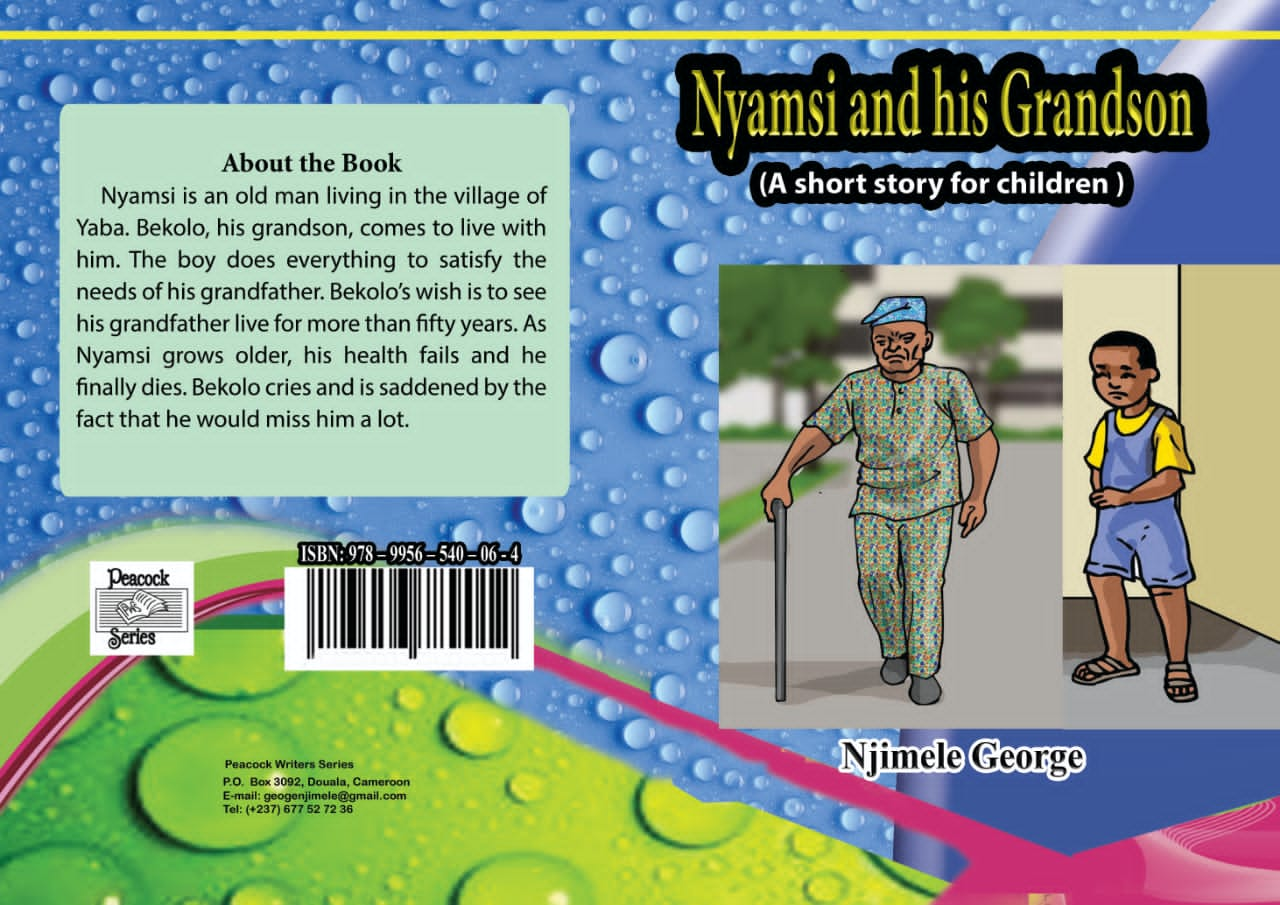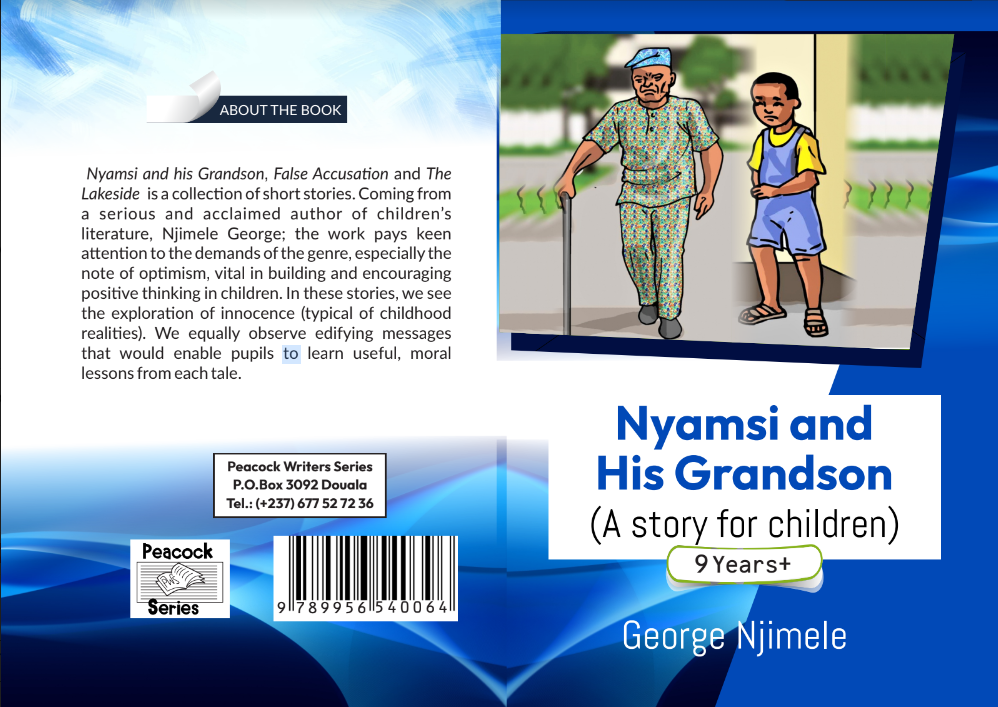Title of the work
Country of the First Edition
Country/countries of popularity
Original Language
First Edition Details
George Mbona Njimele, Nyamsi and His Grandson. Douala: Peacock Writers Series, 2020.
Genre
Short stories
Target Audience
Children (8–10 years)
Cover


Courtesy of the Author.
Author of the Entry:
Eleanor A. Dasi, University of Yaoundé I, wandasi5@yahoo.com
Peer-reviewer of the Entry:
Divine Che Neba, University of Yaoundé 1, nebankiwang@yahoo.com
Daniel A. Nkemleke, University of Yaoundé 1, nkemlekedan@yahoo.com
Elizabeth Hale, University of New England, ehale@une.edu.au

Courtesy of the Author.
George Mbona Njimele
, b. 1973
(Author)
George Njimele was born in Awing, Northwest Region of Cameroon. He attended the University of Buea in Cameroon where he earned a BA in English and French. He started writing at an early age and writes mostly for children and young adults. He took up writing full-time and started the Peacock Writers Series in Cameroon. Some of his works viz, Madmen and Traitors (2015), The Queen of Power (1998), Undeserved Suffering (2008) and Poverty is Crazy (2012) are prescribed in the Cameroon school curriculum (literature awareness) for beginners in secondary school. Other of his works include: King Shaba (2006), House of Peace (2007), Land of Sweet Meat (2017), A Time to Reconcile (2020). He won the National Poetry Prize in 1995 organised by the National Book Development Council. His other work, The Lion and the Tortoise and other Stories was selected for the Cameroon/World Bank Read at Home Project in 2021. He lives with his family in Douala, Cameroon.
Source:
Information provided by the author.
See also The Forum with George Njimele at Elie Smith YouTube channel (accessed: September 22, 2022).
Bio prepared by Eleanor A. Dasi, University of Yaoundé I, wandasi5@yahoo.com
Summary
Nyamsi lived with his wife, Adaya, in the village of Yaba. They had eight children and fifteen grandchildren when Adaya died. Nyamsi was very lonely though he was visited from time to time by his children and grandchildren. When Bekolo (ten years old), one of his grandchildren, completed primary school, his father sent him to live with him. At first, the village setting was not appealing to Bekolo but he got used to it with time and started enjoying it. He made friends with some boys who visited him often to the disapproval of Nyamsi, who felt the boys might derail Bekolo. But Bekolo was hardworking and conscientious and did everything to satisfy the needs of his grandfather – fetching him wood, making sure his colanut and snuff were available, preparing his food the way he liked it, serving it on time and helping him out to bask in the sun. Nyamsi was very pleased with Bekolo and Bekolo, for his part, wished his grandfather could live for fifty more years. Nyamsi hoped so too but complained to Bekolo of the present times that have been overtaken by evil, bad behaviour, wars, deadly diseases and natural disasters. He regretted that people now die young, children do not listen to their parents and elders anymore and do just the wrong things. He appreciated the days of his own father when they could live well over a hundred years.
Nyamsi’s health was slowly failing him and one day, upon trying to get up from his armchair, he realised that he could not. He called out to Bekolo who was now about twelve years old. When he got in, he saw that his grandpa was very weak. He cried out for help. A neighbour came in and found out that Nyamsi was giving his last breath. Then he informed Bekolo that his grandfather had gone to his eternal rest. He added that he was a good man and deserved peace. Bekolo cried, and was saddened by the fact that he would miss him a lot. The news of Nyamsi’s death was announced through the talking drum and the gong. Grandpa Nyamsi’s children gathered home and gave him a befitting burial after which Bekolo returned to live with his parents. He kept thinking and dreaming about his grandfather until one day, he saw an old man who looked very much like his grandfather. He rushed towards him but realised that he was not the one. He however believed that one day, he would see him again.
Analysis
The story emphasises care-giving as a vital part of the African social system. In many traditional African societies it is considered a two-way process, that is, from parents to children and from children back to parents. Thus the older people are taken care of by their offspring as a matter of responsibility. This way, strong family ties and relationships are enhanced as we witness in the relationship between Bekolo and Nyamsi. As a teenage grandson, Bekolo is entrusted with the responsibility of caring for his grandfather, which he performs with relative ease and pleasure, much to the appraisal of the grandfather.
The story also accentuates the disappearance of African socio-cultural values such as respect for elders, good behaviour, and a life style that favours good health, leading to early deaths, as Nyamsi regrets. However, the talking drum and the gong are still relevant as communication instruments/media like in the old days.
Lastly, the story underlines death as the ultimate end. However, the manner of dying and the legacy left behind are reflected in the funeral celebrations organised in honour of the dead. Nyamsi was said to be a good man and that is why he merited a peaceful death and was given a befitting burial.
The story is interspersed with colourful pictures that show Nyamsi among his peers in the village and runs through his activities with his grandfather right through to when the grandfather dies and the final celebration of his life. The pictures give a glimpse of what life in an African village looks like.
In all, the story helps young readers to have a positive attitude towards aging and old age and participate in caring for the older people if they are opportune to because one day, they too will grow old and will definitely need help from close family members.
Further Reading
Agyemang, Akosua F., Long-Term Care and Caregiving for Older Adults in Africa, University of Ghana, Centre for Ageing Studies, 2021.
Lumun, Abanyam Naomi, “The Changing Privileges and Challenges of Older People in Contemporary African Society”, Global Journal of Art, Humanities and Social Sciences 1.4 (2013): 34–43.


